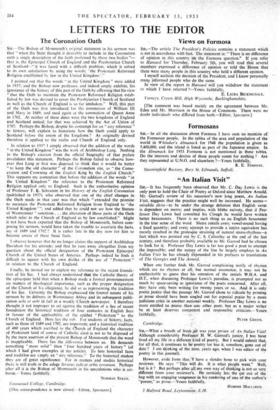LETTERS TO THE EDITOR
The Coronation Oath
Sia,—The Bishop of Monmouth's original statement in his sermon was that " when the State thought it desirable to include in the Coronation oath a single description of the faith professed by these two bodies "- that is, the Episcopal Church of England and the Presbyterian Church of Scotland—" it was faced with a difficult problem, which it solved to its own satisfaction by using the words: the Protestant Reformed Religion established by law in the United Kingdom '."
I pointed out that fhe words " in the United Kingdom " were added in 1937; and the Bishop now professes, and indeed amply exhibits, his ignorance of the history of this part of the Oath by affirming that his view " that the Oath to maintain the Protestant Reformed Religion estab- lished by law was devised to cover the Presbyterian Church of Scotland as well as the Church of England is so far unshaken." Well, this part of the Oath was first introduced for the coronation of William III and Mary in 1689; and used again at the coronation of Queen Anne in 1702. At neither of these dates were the two kingdoms of England and Scotland united; for that was achieved by the Act of Union of 1707. Perhaps the Bishop, despite his contempt for an " airy reference " to history, will explain to historians how the' Oath could apply to Scotland- before the union of the kingdoms ? As originally devised therefore it applied to the realm and Church of England only.
In relation to 1937 1 simply observed that the addition of the words " in the United Kingdom " was the work of Archbishop Lang. Nothing in the Bishop's citation from the official biography of that prelate invalidates this statement. Perhaps the Bishop failed to observe how- ever that Lang at first was disposed to think that it would be better " to keep the old character " of the Coronation rite, as " the Conse- cration aad Crowning of the English King by the English Church." This supports my contention that before the addition of the words " in the United Kingdom " the reference to the Protestant Reformed Religion applied only to England. Such is the authoritative opinion of Professor F. E. Schramm in his History of the English Coronation (published in 1937). who observed that one of the chief changes in the Oath made in that year was that which " extended the promise to maintain the Protestant Reformed Religion from England to ' the United Kingdom ' "; and added that he could not see how the Statute of Westminster " sanctions ... the alteration of those parts of the Oath which refer to the Church of England as by law established." Might it not have been expected that the Bishop of Monmouth, before com- posing his sermon, would have taken the trouble to ascertain the facts, say of 1689 and 1702 ? It is rather late in the day now for him to become aware of these basic facts.
I observe however that he no longer claims the support of Archbishop Davidson for his attitude; and that he runs away altogether from my question about the official designation of the Protestant Episcopal Church of the United States of America. Perhaps indeed he finds it difficult to square with his own dislike of the use of " Protestant " in relation to the Church of England.
Finally. he invited me to explain my reference to the recent founda- tion of his See. I had always understood that the Catholic theory of the episcopate held that when a Bishop made a formal pronouncement on matters of theological importance, such as the proper designation of the Church of his allegiance, he did so as representing the tradition of his See. Certainly the Bishop emphasised the -formal nature of his sermon by its delivery in Westminster Abbey and its subsequent publi- cation urbi et orbi in full in a weekly Church newspaper. I therefore thought it not improper to set against the tradition of a-See of recent 'foundation the historical tradition of four centuries in English Sees in favour of the applicability of the epithet " Piotestant " to the Church of England. Here lies the rub. For students of history, .facts, such as those of 1689 and 1702, are important; and a historical tradition of 400 years which ascribed to the Cturch of England the character of Protestant (and of course of Catholic also) is not to be disposed of by the mere assertion of the present Bishop of Monmouth that the word is inapplicable. There lies the differentia between us. He demands something " more solid " than " four hundred years of history " (of which I had given examples in my article). To him historical facts and traditibn are simply an " airy reference." To the historical student they are of great significance. For in matters and studies historical there is still truth in the adage Securus judicat orbis terrarum. Perhaps after all it is the Bishop of Monmouth in his speculations who is air-
borne.—Yours faithfully.. - E 1 College, Canibridge.
NORMAN SYKES.
[This correspondence is now closed.—Editor, Spectator.]


































 Previous page
Previous page